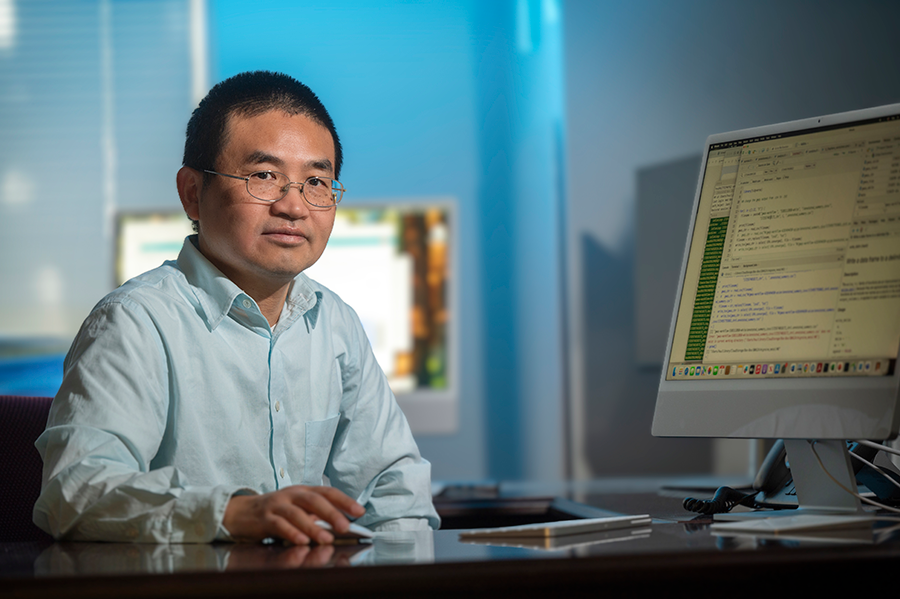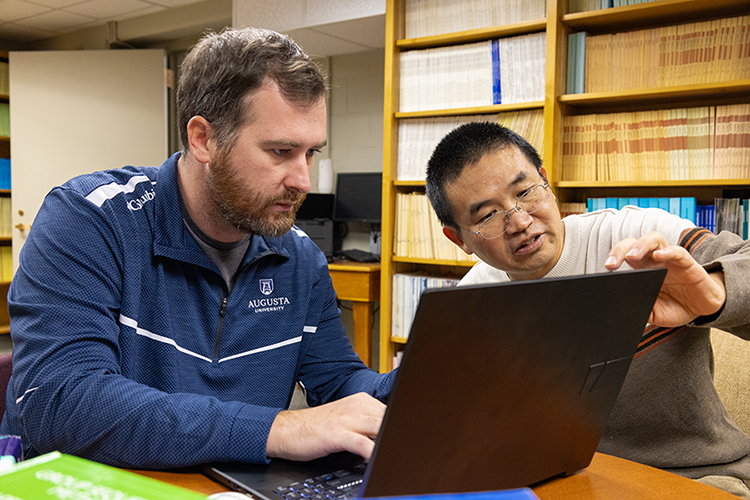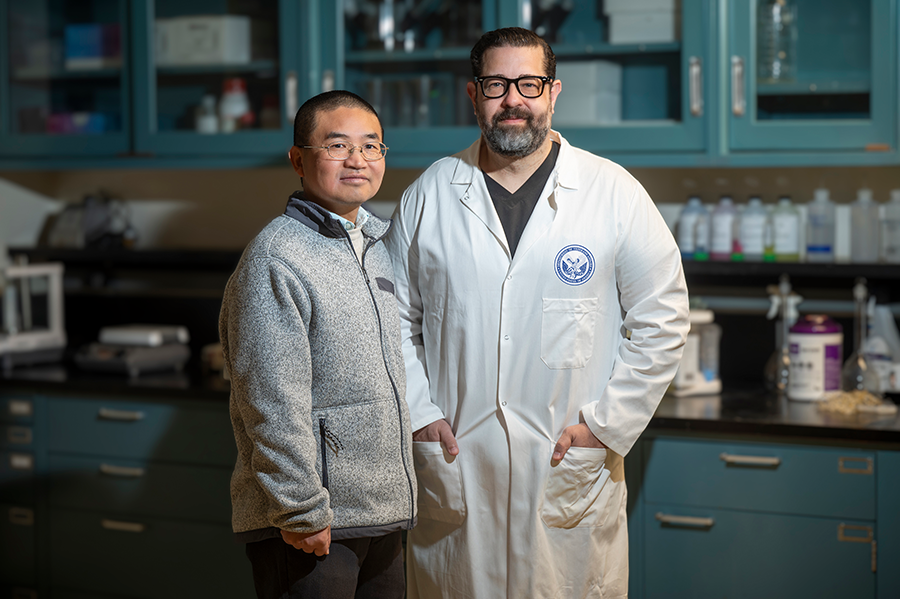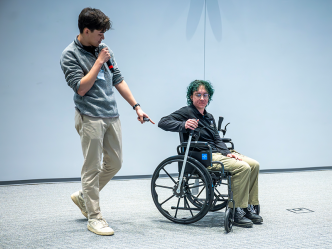Through a new partnership between Augusta University and the Charlie Norwood Veterans Affairs Medical Center, Hongyan “Nathan” Xu, PhD, professor of genomics, data science and biostatistics in the Department of Biostatistics, Data Science, and Epidemiology in AU’s School of Public Health, has received a $10,000 award from the Augusta Biomedical Research Corporation, the VA nonprofit research and education corporation.
For many years, AU and the VA Medical Center have enjoyed a strong collaboration in the research, education and clinical care pillars through which AU research and clinical faculty serve veterans while medical, nursing and other health sciences students gain valuable, real-world experience.
Now, AU and the VA are working to bridge the gap between translational science, clinical science and data science through the Data Science, Artificial Intelligence and Technology Research Cluster, also known as DART, an initiative developed by Amado Alejandro Báez, MD, PhD, with the hopes of enhancing collaborations between AU and the VA.
“This partnership with the VA is a very good opportunity, especially for our data science students because it will give them access to real-world projects and data. They can start truly practicing what they learn from our program because they will have access to data from both the research bench, as well as the clinical bedside, all wrapped up in national databases. This will better prepare our students to stand out in their future careers.”
Hongyan “Nathan” Xu, PhD, professor of genomics, data science and biostatistics in the Department of Biostatistics, Data Science, and Epidemiology
Báez has always been passionate about developing synergies, links and channels between translational science, clinical science and data science as a tool to expedite the translation of research from bench to bedside.
Currently the associate chief of staff for research and development with the U.S. Department of Veterans Affairs Augusta Health Care System, Báez is also an adjunct professor of Health Management, Economics, and Policy with SPH and was formerly the co-director of the Master of Science in Clinical and Translational Research program at AU, as well as a vice chair and professor of emergency medicine and epidemiology. When he joined the U.S. Department of Veterans Affairs Augusta Health Care System to strengthen the Research and Development program, he knew he wanted to expand the interconnectedness of the VA and find a way to better connect with Augusta University as the primary academic affiliate of the Augusta VA.
“The VA at Augusta has a very robust bench and basic science program. We have three floors of research space and more than 40 dedicated scientists and staff, but we saw an amazing opportunity to further develop the relationship between translational, clinical science and data science,” Báez said. “By looking at data science as a tool, not just to develop data science-specific research, but also to strengthen and expedite translational and clinical and health systems research, we started exploring what that would look like.”
Báez said one of the first things his team did was pull in scientists and faculty from AU, the VA and the Augusta medical community to create collaborative interdisciplinary research clusters, the first of which is DART. The goal is to enhance synergies between the VA and AU and create a more comprehensive presence in the data science, artificial intelligence and technology spaces.
The DART leadership team includes Brian Le, MD, a physician of rheumatology at the Charlie Norwood Veterans Affairs Medical Center Downtown Division; Rachel Elam, MD, assistant professor in MCG’s Department of Medicine: Rheumatology and a rheumatologist at Wellstar MCG Health; Jay Hedge, PhD, associate professor in MCG’s Department of Neuroscience and Regenerative Medicine; and Xu.

With the VA research team’s support, the Augusta DART Cluster team has been able to already generate and submit four different collaborative data science and AI-related research proposals.
The national VA spends around $2 billion on research every year, including the Million Veteran Program. The MVP is a research program from the U.S. Department of Veterans Affairs that studies how genes, lifestyle, and military experiences affect health. The program’s goal is to improve health for veterans and the general public. With more than 1 million veterans in the database, more than 650,000 service members have been genotyped and more than 140,000 have had their whole genome sequenced. This comprehensive database also includes phenomics and metabolomics and proteomics – a true comprehensive “multi-omics” database.
What this means is researchers now have access to one of the nation’s largest biorepositories and one of the world’s most genetically diverse cohorts.
“With all the technology we have, it is imperative that we approach research, development and innovation through collaborations. Islands of power are a thing of the past, and nobody is going to be able to provide meaningful growth and meaningful contributions working alone. The future of science and medicine needs to involve working collaboratively.”
Amado Alejandro Báez, MD, PhD, associate chief of staff for research and development with the U.S. Department of Veterans Affairs Augusta Health Care System
Xu is currently engaged in research related to the genetics of migraines. By having access to the VA’s data set from the Million Veteran Program, he is able to investigate the cause behind why migraines affect women more than men.
“By having access to this very unique data set to analyze, we can actually see what’s going on in males versus females, and that could lead to a ‘precision medicine’ treatment that can greatly benefit the general public,” Xu said.
Báez sees this as a great way to help the School of Public Health continue to grow and extend its reach, and he sees it as a starting point for a deeper, long-lasting relationship.
“One of the things we have been able to do is allocate seed funding to help develop projects, including this project from AU’s School of Public Health,” Báez said.
As Augusta University’s School of Public Health continues to grow and expand its reach, the school’s faculty is looking for unique ways to create synergies and collaborations that will have a positive impact, both on students and citizens alike. Through his collaboration with the VA, AU’s data science students now have access to real-world data to be able to help the VA bridge that gap between the different sciences, which will in turn help the broader public.
“This partnership with the VA is a very good opportunity, especially for our data science students because it will give them access to real-world projects and data,” said Xu, who was recently named a guest editor for the special issue “Advances in Bioinformatics of Human Diseases” in the scientific journal Genes. “They can start truly practicing what they learn from our program because they will have access to data from both the research bench, as well as the clinical bedside, all wrapped up in national databases. This will better prepare our students to stand out in their future careers.”

This approach is what led to Xu receiving the $10,000 grant for data science. Part of the grant allowed Xu to attend the SCCM.org Datathon in Chicago in 2024, and he is now taking what he learned there to create the first AU/VA Datathon this May.
“I was able to experience firsthand how the datathon in Chicago served as a good opportunity for data scientists, clinicians and other researchers to come together to form a team and address issues from different angles,” Xu said. “It’s very intensive as everyone in the team works together to contribute to the final presentation. At the end, each team gets evaluated, which is great to have that feedback, and our team in Chicago even had an abstract accepted.”
“The name of the game is collaboration. You need to build synergies, and you need to collaborate in an effort to grow,” Báez said. “With all the technology we have, it is imperative that we approach research, development and innovation through collaborations. Islands of power are a thing of the past, and nobody is going to be able to provide meaningful growth and meaningful contributions working alone. The future of science and medicine needs to involve working collaboratively.”
 Augusta University
Augusta University




